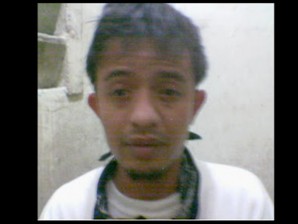
This photo posted on freejonasburgosmovement.blogspot.com was allegedly taken after Jonas Burgos was abducted in 2007.
BAGUIO CITY, Philippines—A military officer linked to the abduction and disappearance of activist Jonas Burgos in 2007 said on Saturday he was a victim of mistaken identity.
Army Major Harry Baliaga Jr. said his family and members of the Besao community in Mountain Province had testified that he joined a clan reunion on April 28, 2007, the day Burgos was taken from the Ever Gotesco Mall in Quezon City.
“We presented the investigators and the court evidence that I was in Besao (a town in Mountain Province) on that date,” Baliaga said but the authorities gave more weight to the testimony of a witness, who claimed to have seen him with Burgos’ alleged abductors based on a photograph posted on social networking site, Facebook.
In a March 18 ruling, the Court of Appeals, which was tasked to enforce a Writ of Amparo on the Burgos case, declared Baliaga “responsible for the forced disappearance of Jonas Burgos,” and held the military accountable for the misdeed.
The court also directed the military, the police and the Commission on Human Rights to proceed with the investigation, after stating that it had not ruled on Baliaga’s criminal responsibility which should be addressed in a proper forum.
“I have not been charged with any crime,” Baliaga told the Inquirer here on Saturday. “But my mother testified I was in Besao and she could not understand why no one believed her.”
He said the appellate court was persuaded by a CHR report that deduced his culpability based on the Facebook photograph, and his previous assignment in Bulacan as a member of the Army’s 56th Infantry Battalion.
According to him, he left Bulacan in 2004 for other duty tours until he was assigned to the Army’s Special Forces in 2006.
Baliaga said his relatives and members of the community in Besao were devastated about the way the court and the media treated him.
He sought out the Inquirer to clear his name.
Like many families enjoying summer, Baliaga spent the weekend in this city with his wife, Rachel, and his three children.
Rachel, a Baguio-based nurse, said they managed to keep smiling for their son, 4, and their twin daughters, 2, “burying the anxiety that has given us sleepless nights since 2011.”
That was the year the CHR implicated Baliaga in Burgos’ disappearance, she said.
Baliaga, a member of Philippine Military Academy Sanghaya Class of 2000, said he was stationed at the PMA to lecture on tactics when he was told about the CHR report.
“That was the reason why I was asked to transfer” to the Philippine Army headquarters, he said.
Rachel, a University of the Philippines Baguio graduate, said the CHR report was also the reason she quit her job at the Baguio General Hospital and Medical Center.
The family has shuttled back and forth to deal with Baliaga’s legal troubles, she said, adding that “it was difficult for the children so I decided to be a full-time mother until we can sort out this problem.”
Baliaga said the CHR completed its report on the Burgos case without interviewing him.
He said the military supplied the CHR and the court with all his deployment records, including the fact that he was undergoing a basic airborne course for the Special Forces on the month Burgos vanished in 2007.
The appellate court’s March decision said it was mindful of Baliaga’s alibi, but it concluded that the evidence as well as the testimonies supplied by Besao residents could not “prevail over the positive identification” made by the witness Jeffrey Cabintoy.
The court also said that Baliaga’s evidence “does not necessarily discount the possibility that he was part of the group that perpetrated the abduction,” based on a CHR testimony that the military occasionally undertakes missions using composite teams from its various branches.